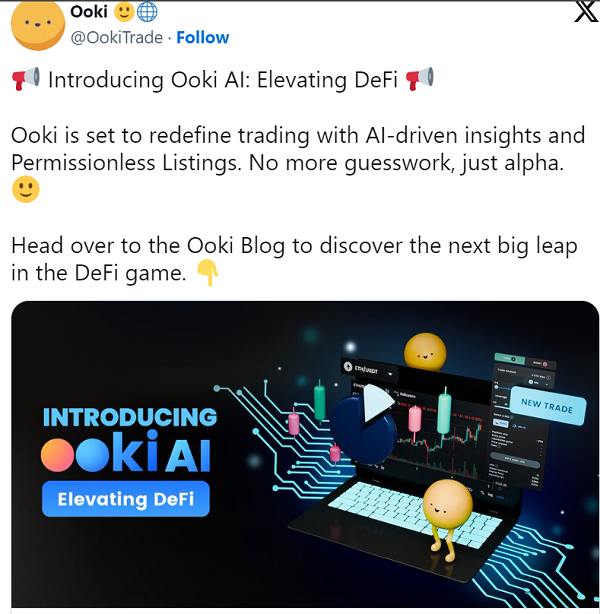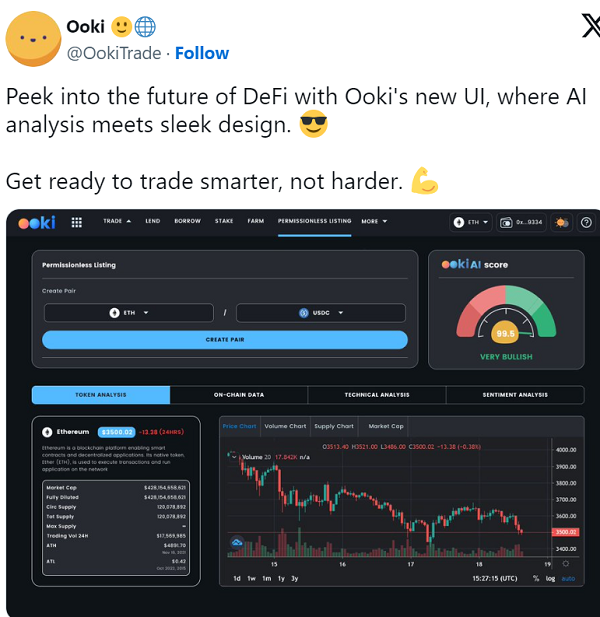Ooki, a decentralized finance DAO, innovates by combining artificial intelligence and permissionless listings.
The decentralized finance (DeFi) space is crowded with thousands of tokens with varying use cases, while coins with new utilities emerge occasionally. While enriching the DeFi ecosystem with diverse investment options, this proliferation of tokens also introduces a significant challenge for users.
The primary obstacle lies in the difficulty of monitoring this expansive market to identify tokens that not only present a novel utility but also possess genuine potential for growth and stability. The dynamism and the sheer volume of choices necessitate an enhanced mechanism for users to sift through the vast array of tokens effectively, ensuring they can pinpoint those with real promise amidst a sea of contenders.
For users to make properly informed trading decisions, DeFi platforms have to widen their coverage of the market, which highlights the need for a holistic approach. This is where innovative technologies like artificial intelligence can assist protocols.
AI and permissionless listings for dynamic trading
Ooki is a DeFi platform integrating artificial intelligence (AI) and permissionless listings to kite out DeFi traders to enable confident and informed decision-making when spotting and trading tokens.
Ooki AI is engineered to offer in-depth analysis of cryptocurrencies by using diverse data sources. It covers tokenomics such as market capitalization and supply details and on-chain data, including token movements, transaction volumes and status of locked tokens to get the picture of liquidity and investor interest in the market.

The artificial intelligence service also provides off-chain technical analysis by applying popular indicators like moving averages and relative strength index (RSI). Off-chain abilities of Ooki AI include social media analysis to determine market sentiment and current trends. The service presents actionable insights by compiling the gathered market data.
When it comes to putting data and insights into use, permissionless listings allow for token trading without the requirement of central approval, speeding and simplifying the process. This new feature equips users with the ability to include underrepresented tokens in the market and avoid missing out on the hype surrounding them, all the while creating a diverse and dynamic trading environment with easy access.

When combined with Ooki AI, the permissionless listings feature seeks to enhance individual trading strategies with sophisticated tools and information. Users do not have to wait for a token to be listed on an exchange in order to trade it and miss out on the hype surrounding the token because of the wait. Ooki allows users to list the token by themselves in a reliable and simple way to start trading immediately. Ooki is actively exploring the most effective applications of AI to further refine and enhance its platform capabilities.
The decentralized protocol also supplies users with tools for lending, borrowing and staking and allows users to get involved in derivatives trading.

Ooki Protocol operates as a true DeFi decentralized autonomous organization (DAO) run solely by the community. DAO participants stake the OOKI token, the native token of the protocol, to vote on proposals and govern the protocol’s future democratically and transparently.
Ooki has partnered with many prominent projects in the Web3 space, currently operating on Ethereum, Arbitrum, Optimism, Polygon and BNB Chain.
Helping users navigate DeFi
Working for a democratic DeFi space integrated with cutting-edge technology, Ooki envisions a future where anyone can confidently trade using AI and permissionless listings.
“Ooki’s mission is to unlock the full potential of DeFi, making it accessible, insightful, and adaptable for all. This isn’t just evolution; it’s a revolution in how we interact with digital finance.”
The world of DeFi is rapidly evolving into an expanded universe, or to be more exact, into a multiverse. AI innovations like Ooki AI can aid users in navigating them, fostering a better future for DeFi.


All Comments